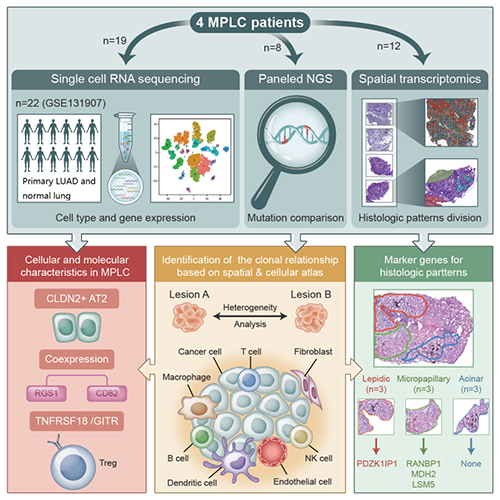更新于:2024-11-01
CLDN2
更新于:2024-11-01
基本信息
别名 claudin 2、Claudin-2、CLDN2 + [1] |
简介 Plays a major role in tight junction-specific obliteration of the intercellular space, through calcium-independent cell-adhesion activity. |
关联
1
项与 CLDN2 相关的药物作用机制 CCL20抑制剂 [+2] |
在研机构- |
在研适应症- |
非在研适应症 |
最高研发阶段终止 |
首次获批国家/地区- |
首次获批日期1800-01-20 |
100 项与 CLDN2 相关的临床结果
登录后查看更多信息
100 项与 CLDN2 相关的转化医学
登录后查看更多信息
0 项与 CLDN2 相关的专利(医药)
登录后查看更多信息
1,101
项与 CLDN2 相关的文献(医药)2024-12-01·Animal Bioscience
Dietary Mulberry leaf 1-deoxynijirimycin supplementation shortens villus height and improves intestinal barrier in fattening rabbits
Article
作者: Li, Shaocong ; Jiang, Zijie ; Barcenas, Adileidys Ruiz ; Barcenas, Adileidys Ruiz ; Wang, Yuhua ; Serrano, Boris Ramos ; Zhao, Weiguo ; Serrano, Boris Ramos ; Hou, Qirui ; Li, Tao ; Hou, Wenyu
2024-12-01·Poultry Science
Early weaning damages the intestinal epithelial barrier of squabs through toll-like receptor signaling pathways
Article
作者: Lv, Mengqi ; Ling, Tianliang ; Yuan, Yiwei ; Dong, Xinyang ; Xu, Qianqian ; Zou, Xiaoting
2024-11-01·Fish & Shellfish Immunology
Supplementation with Akkermansia muciniphila improved intestinal barrier and immunity in zebrafish (Danio rerio)
Article
作者: Gui, Zewei ; Yang, Guokun ; Yang, Boya ; Chang, Xulu ; Meng, Xiaolin ; Huang, Zhenyi ; Wang, Yawei ; You, Fu ; Zhang, Xindang
8
项与 CLDN2 相关的新闻(医药)2024-04-03
·今日头条
04月03日的《热心肠日报》,我们解读了 15 篇文献,关注:心血管,IBD,昼夜节律,紧密连接蛋白,肠神经,肠道运动,肠道生理,Gritstone bio,爱荷华州立大学,乐普医疗,济群医疗,Get Joy。
该篇日报由R·AI辅助创作生成,人工审核校对。
Cell:肠道菌群+代谢组分析,揭示出代谢胆固醇的肠菌
Cell——[64.5]
① 本研究对弗雷明汉心脏研究队列的1429人进行了粪便宏基因组学和非靶向代谢组学分析,探索肠道菌群对心血管疾病(CVD)的影响和机制;② 多组学分析揭示了与CVD指标相关的微生物和代谢物,并分析了与CVD相关的微生物途径(如类黄酮、γ-丁基甜菜碱和胆固醇代谢);③
Oscillibacter
菌属物种与粪便和血液胆固醇水平降低相关;④ 结合分子网络和蛋白质语言模型进行功能预测,鉴定出
Oscillibacter
物种编码的保守的胆固醇代谢基因(如
IsmA
和
CgT
的同系物)和衍生产物(如胆甾烯酮和糖基化胆固醇);⑤ 体外实验证实,源自人肠道的
Oscillibacter
分离株能有效摄取胆固醇并将其转化为胆甾烯酮、糖基化胆固醇和羟基胆固醇等代谢物;⑥ 这些发现为靶向肠道菌群以改善心血管健康提供了新的科学依据。
【原文信息】
Gut microbiome and metabolome profiling in Framingham heart study reveals cholesterol-metabolizing bacteria
2024-04-02 , doi: 10.1016/j.cell.2024.03.014
Cell:结肠炎中的细胞生物地理学研究
Cell——[64.5]
① 本研究利用MERFISH技术分析了小鼠结肠中的135万个细胞、940个基因的表达谱,揭示了结肠炎和恢复过程中的细胞和空间重塑;② 确定了健康细胞群和炎症相关细胞群的多样性,绘制了它们的空间组织,并揭示了它们在炎症中的极化或招募,炎症相关成纤维细胞(IAF)反应比预期更加多样化;③ 基于细胞群的空间组织特点,定义了25个细胞邻域(neighborhood),并揭示了这些邻域在肠道炎症不同阶段的进展性演变,这种组织重塑一定程度上是由多种IAF定义的,它们具有独特的表达谱、空间定位、细胞间互作和健康成纤维细胞起源;④ 在人类溃疡性结肠炎中发现了类似的特征,表明这些过程在人类中可能是保守的。
【原文信息】
Charting the cellular biogeography in colitis reveals fibroblast trajectories and coordinated spatial remodeling
2024-04-02 , doi: 10.1016/j.cell.2024.03.013
Nature子刊:发育过程中,肠道昼夜节律如何形成?
Nature Communications——[16.6]
① 本研究揭示了在果蝇成体肠道中昼夜节律时钟的突然出现及其与环境逐渐同步的过程,为理解昼夜节律在发育和干细胞系中的作用提供了新视角;② 生物钟在成体果蝇肠道中突然开始,并在肠道发育完成后逐渐与环境同步,这种延迟是因为早期阶段的个别细胞缺乏完整的生物钟基因网络;③ 随着肠道的发育,生物钟首先在肠道干细胞中形成,Ecdysone和Hnf4信号的变化影响Clk/cyc的转录活性,从而驱动tim、Pdp1和vri的表达;④ 在成熟肠道中,干细胞谱系的分化暂时中断了不同分化后代中的生物钟活性,类似于早期发育中没有生物的现象。
【原文信息】
The emergence of circadian timekeeping in the intestine
2024-02-27 , doi: 10.1038/s41467-024-45942-4
北肿团队Nature Reviews:紧密连接蛋白claudin 18.2——治疗胃癌新靶点
Nature Reviews Clinical Oncology——[78.8]
① 日本国立癌症研究中心东医院研究学者与北京大学肿瘤医院沈琳教授团队合作,围绕紧密连接蛋白claudin 18.2在胃癌治疗中的潜力进行综述性总结;② Claudin 18.2特异性地表达于非恶性胃黏膜上皮细胞,但在消化系统恶性肿瘤中会异位至肿瘤细胞表面并高表达;③ 两项关键的III期临床试验证明,针对claudin 18.2的抗体zolbetuximab显著提高了晚期胃癌患者的无进展生存期和总生存期,标志着claudin 18.2成为胃癌治疗的一个有效靶点;④ 除了单克隆抗体外,双特异性抗体、抗体药物偶联物、嵌合抗原受体T细胞和基于mRNA的方法等新型治疗手段在针对claudin 18.2表达的胃癌患者中展现出巨大潜力;⑤ 针对claudin 18.2的治疗策略有望扩展到其他claudin 18.2阳性的实体瘤疾病中。
【原文信息】
Claudin 18.2 as a novel therapeutic target
2024-03-19 , doi: 10.1038/s41571-024-00874-2
肠道紧密连接蛋白Claudin-2或是脓毒症的潜在治疗靶点
PNAS——[11.1]
① 本研究揭示了在脓毒症中,claudin-2的上调和孔径通道通透性的增加是导致菌群失调、肠道损伤、炎症、病原体控制无效和败血症患者死亡率增加的关键中间体;② 脓毒症患者和模型小鼠中,小肠上皮细胞的claudin-2表达被选择性上调,同时细胞间孔径通道的通透性增加;③ 在脓毒症模型中,claudin-2敲除(KO)可阻止孔径通道通透性的增加,减少IL-17的产生、T细胞活化,并限制肠道损伤,这些效应与KO小鼠腹腔液的中性粒细胞、巨噬细胞、树突状细胞和细菌数量的减少相关;④ claudin-2敲除显著提高了脓毒症小鼠的存活率,且将claudin-2敲除且诱导脓毒症小鼠的盲肠菌群移植给WT健康小鼠的致病性显著低于野生型小鼠;⑤ claudin-2的表达对败血症期间激活的致命级联反应的进展具有显著影响,表明claudin-2可能是败血症患者中非常具有潜力的治疗靶点。
【原文信息】
Claudin-2 upregulation enhances intestinal permeability, immune activation, dysbiosis, and mortality in sepsis
2024-02-27 , doi: 10.1073/pnas.2217877121
浙大团队:小鼠肠神经系统完全源自迷走神经嵴细胞
Gastroenterology——[29.4]
① 浙江大学医学院的王良与国外团队合作发表文章,通过遗传工程鼠胚和细胞迁移实验,揭示了哺乳动物肠神经系统(ENS)完全源自迷走神经嵴细胞(vNCCs),推翻了先前关于骶部神经嵴细胞(sNCCs)也有贡献的观点;② 构建基因改造小鼠,对包括vNCCs的pan-NCCs或不包括vNCCs的骶/躯干部神经嵴细胞(s/tNCCs)进行谱系追踪,发现pan-NCCs和s/tNCCs对已经建立的神经嵴细胞(NCCs)有贡献,但只有pan-NCCs对ENS有贡献;③ 双谱系追踪结合三维重建显示,s/tNCCs以复杂的模式定居在骨盆神经丛和直肠周围组织中,解释了以往对其贡献的混淆;④ 共培养实验显示,自主神经、感觉和神经管外植物向直肠的细胞迁移是非特异性的;⑤ 对ENS前体进行谱系追踪,证明小鼠ENS的起源是独家由vNCCs提供。
【原文信息】
Sacral neural crest-independent origin of the enteric nervous system in mouse
2024-03-05 , doi: 10.1053/j.gastro.2024.02.034
新方法更有效对肠神经进行计数
Gastroenterology——[29.4]
① 这项研究发现相比于传统的组织切片技术,组织透明化和三维成像技术能更好地分析肠神经系统(ENS)的结构信息,揭示了ENS结构在儿童期间会发生变化,这种三维ENS解剖学可能为人类肠道运动障碍,包括赫什朋病(Hirschsprung disease, HD),提供新的视角;② 对11个人类结肠和1个回肠样本以及已知无肠道问题的远端结肠标本进行清晰、染色和共聚焦显微成像;③ 从新生儿到60岁的人类结肠中,肠神经系统的结构随年龄变化,包括肌间丛面积、ENS神经节面积、肌间丛中神经节所占比例、每平方毫米神经元数量和神经元Feret直径等指标;④ 三维成像的神经元计数显示高度可重复性,新生儿结肠的高ENS密度使得在较小区域内(500 x 500 μm2)也能进行可靠的神经元计数;⑤ HD病的远端肠道缺乏ENS,其样本在近端边缘肠神经元密度上变化了8倍,并在切除的肠道中具有多样的ENS结构。
【原文信息】
Three-dimensional imaging of the enteric nervous system in human pediatric colon reveals new features of Hirschsprung disease
2024-03-15 , doi: 10.1053/j.gastro.2024.02.045
Cell子刊:肠神经系统如何影响肠道微生物和肠道生理?
Cell Reports——[8.8]
① 本研究揭示了特定的外周神经元激活对小鼠肠道微生物群落及其代谢产物和宿主生理的影响,为理解肠道神经系统与微生物之间的相互作用提供了新见解;② 通过激活表达乙酰胆碱转移酶(ChAT)或酪氨酸羟化酶(TH)的肠道相关神经元,发现这些神经元的不同亚型在塑造微生物群落结构(包括调节胆汁酸谱和真菌定植方面)发挥着广泛作用;③ 激活ChAT+或TH+神经元均可增加粪便排泄量,但只有ChAT+激活才会导致结肠收缩增加和类似腹泻的液体分泌;④ 这些结果表明,特定的外周神经元亚型激活在不涉及大脑信号的情况下,以不同方式调节小鼠的肠道微生物群落和胃肠生理。
【原文信息】
Peripheral neuronal activation shapes the microbiome and alters gut physiology
2024-03-21 , doi: 10.1016/j.celrep.2024.113953
外周5-羟色胺神经元或调节肠道蠕动和焦虑样行为
Current Biology——[9.2]
① 本研究揭示了外周5-羟色胺神经元在调节肠道蠕动和焦虑样行为中的作用,为开发新型治疗方法提供了参考;② 通构建一种外周神经元中缺乏产生5-羟色胺酶Tph2、但中枢神经元中的Tph2保持完整的小鼠,发现全身敲除Tph2的小鼠会表现出领土攻击性的增加,而仅在外周神经元中敲除Tph2没有这种现象;③ 与全身Tph2敲除小鼠相似,这些条件性敲除Tph2的小鼠展现处肠道蠕动减少和焦虑样行为降低;④ 这些结果表明,外周5-羟色胺神经元对肠道蠕动和焦虑样行为的控制有重要作用。
【原文信息】
Peripheral serotonergic neurons regulate gut motility and anxiety-like behavior
2024-02-26 , doi: 10.1016/j.cub.2023.12.072
果蝇前肠通过感官信息协调消化和免疫反应
PNAS——[11.1]
① 本研究分析了果蝇前肠如何通过感官信息协调消化和免疫反应,发现在动物进化过程中,前肠以一种保守的方式协调饮食感知、激素调节和免疫;② 通过GFP标记和Gal4报告基因系列验证了不同细胞类型,发现与前肠相关的神经内分泌细胞通过协调肠道活动与营养、菌群和昼夜周期发挥重要的整合作用;③ 前胃(PV)由多种上皮细胞构成,PV分泌沿肠道排列的围食膜基质,控制消化和肠道菌群的相互作用,在靠近肠细胞的地方会产生大量黏液,类似于哺乳动物的肠黏膜;④ 食道和唾液腺表达的分泌蛋白排列在食道表面,其中一些可能产生前肠共生生态位,容纳特定的肠道菌群。
【原文信息】
Cellular and molecular organization of the Drosophila foregut
2024-03-05 , doi: 10.1073/pnas.2318760121
Gritstone bio公布癌症疫苗GRANITE治疗结直肠癌积极结果
① 4月2日,Gritstone bio公司宣布,其个体化癌症疫苗GRANITE在结直肠癌临床2/3期试验中显示出积极结果;② GRANITE联合免疫检查点抑制剂及氟嘧啶/贝伐珠单抗作为一线维持治疗,可改善微卫星稳定性结直肠癌(MSS-CRC)患者的疾病无进展生存期(PFS);③ MSS-CRC患者占结直肠癌患者的80-85%,其肿瘤通常对免疫疗法不敏感;④ 临床试验共104位患者入组,初步分析67位患者数据显示,GRANITE组患者PFS有早期获益趋势;⑤ GRANITE疫苗已获得FDA的快速通道资格,研究预计2024年第三季度获得成熟的PFS数据,2025年上半年获得总生存期数据。
【原文信息】
速递 | 改善结直肠癌患者PFS!有效治疗“冷”肿瘤的mRNA疫苗结果出炉
2024-04-02 , 药明康德
爱荷华州立大学获250万美元NIH资助研究肠-心脏轴
① 近日,美国爱荷华州立大学科研人员Ajit Vikram博士获得美国国立卫生研究院(NIH)250万美元(约合人民币1808万元)资助,用以研究肠-心脏轴;② 该项目旨在揭示肠道微生物如何影响心脏健康,特别是在心脏超负荷工作条件下的健康问题;③ Vikram的实验室自2017年以来一直在研究肠道微生物如何能够保护心脏免受疾病影响,其近期研究发现,肠道微生物调节的microRNA(miR-204)在应对心脏压力中起着关键作用;④ 未来,研究将结合微生物组学、宏基因组学、代谢组学、免疫学以及microRNA相关知识,以期能发现治疗心力衰竭的潜在治疗靶点。
【原文信息】
Vikram receives $2.5M R01 to examine the heart-gut connection
2024-04-01 , University of Iowa
乐普医疗MWN101两项2期临床完成首例患者给药
① 3月29日,乐普医疗宣布,旗下上海民为生物自主研发的MWN101注射液两项2期临床试验完成首例受试者给药;② MWN101是国内首个GLP-1/GCGR/GIP-Fc融合蛋白药物,用于治疗2型糖尿病和肥胖或超重;③ 该药物通过血糖依赖性刺激胰岛素分泌、延缓胃排空等机制调节人体代谢和控制血糖;④ 两项2期临床研究旨在评价MWN101治疗2型糖尿病和超重或肥胖患者的有效性、安全性及药代动力学特征。
【原文信息】
乐普医疗:关于自愿披露GLP-1/GCGR/GIP-Fc融合蛋白MWN101完成Ⅱ期临床试验首例受试者给药的提示性公告
2024-03-29 , 股吧
济群医药IBD新药GP-033临床获批
① 近日,济群医药新药GP-033软胶囊获得国家药监局药品审评中心审评通过和临床批件;② GP-033拟定适应证为:治疗炎症性肠病(IBD),包括溃疡性结肠炎和克罗恩病等;③ GP-033是一种新一代钙调磷酸酶抑制剂,与现有药物相比,GP-033活性强3倍以上,安全性更高,治疗窗更宽;④ 鉴于GP-033的活性和安全性,其在较低剂量下可用于中重度溃疡性结肠的缓解和维持治疗,临床有效性和安全性明显优于经典药物环孢素。
【原文信息】
再下一城!济群医药IBD新药GP-033喜获临床批件
2024-03-30 , 济群医药科技
Get Joy宣布与Phillips Pet Food and Supplies建立合作
① 3月28日,Get Joy宣布与宠物食品分销商Phillips Pet Food and Supplies建立合作伙伴关系;② 本次合作旨在将Get Joy的犬类健康产品通过直销和零售渠道覆盖全美国;③ Get Joy成立于2019年,专注于研发营养健康产品来提升犬类及其家庭的生活质量;④ 其产品线包括冻干餐、新鲜餐食、冻干食品零食、咀嚼片以及即将推出的补充剂;⑤ 其产品将通过Phillips Pet Food and Supplies在美国的6000多家独立宠物零售商进行销售。
【原文信息】
Get Joy partners with Phillips Pet Food and Supplies
2024-03-28 , Pet Food Industry
感谢本期日报的审核者:mildbreeze,章台柳,RZN,Richard,lxx
点击阅读过去10天的日报:
0402 | 保肠护关节:高分研究揭示抵御关节炎的肠道因子
0401 | 3月,最值得关注的35篇肠道健康要闻!
0331 | 聚焦特殊人群:老年人和孕妈妈的饮食新知
0330 | Akk菌或是免疫性肾病帮凶?Science子刊揭示机制
0329 | 33页综述纵论:超加工食品健康转型的新策略
0328 | Science子刊:锁定肠道中让病毒逃脱免疫的"避风港"
0327 | 10文聚焦菌群-肠-脑轴研究新进展
0326 | 100分综述详解:IBD细胞因子疗法最前沿
0325 | 大肠癌患病为何年轻化?遗传与生活方式的双重影响
0324 | 大型临床试验:补钙补D如何影响老年女性长期健康?
临床研究微生物疗法
2023-08-04
·生物谷
近日,中国科学院大连化学物理研究所分离分析化学重点实验室生物分子功能与机制研究组研究员朴海龙团队与辽宁省肿瘤医院胸外科教授刘宏旭团队合作,整合利用单细胞转录组及空间转录组技术,运用生物信息学及机器学习
近日,中国科学院大连化学物理研究所分离分析化学重点实验室生物分子功能与机制研究组研究员朴海龙团队与辽宁省肿瘤医院胸外科教授刘宏旭团队合作,整合利用单细胞转录组及空间转录组技术,运用生物信息学及机器学习方法,从基因表达、细胞组成及空间结构多个尺度对多原发肺癌的肿瘤微环境进行深入研究,发现了在多原发肺癌中显著性高表达的基因CLDN2、RGS1、CD82等,为临床上区分多原发肺癌和肺内转移提供了有效的生物标记物。
多原发肺癌是指在同一个肺癌病人肺部同步生长的多个原发性肿瘤。不同于多原发肺癌,肺内转移则是指同一个肺癌病人肺部的多个癌症病灶中包含至少一个原发病灶和一个转移病灶。有研究报道,临床上约15%的肺癌病人属于多原发肺癌。然而,目前在临床中仍难以区分多原发肺癌和肺内转移,尤其是针对具有相似组织学特征的多个病灶。
本工作整合利用单细胞转录组和空间转录组技术,综合运用生物信息学和机器学习方法,全面解析了多原发肺癌中不同病灶的肿瘤微环境在分子表达、细胞组成、空间构成多个尺度的特征,并通过与单发肺癌的单细胞数据的对比分析,识别了具有多原发肺癌特异性的细胞类型——CLDN2高表达的二型肺泡细胞。同时,研究人员利用免疫组化的方法验证了多原发肺癌癌症组织中CLDN2的表达水平显著高于癌旁组织,以及单发肺癌、肺内转移的癌症组织、CLDN2可以作为鉴定多原发肺癌的生物标记物。研究进一步通过细胞拟时分析、细胞通讯分析、空间细胞组成预测,对CLDN2高表达的二型肺泡细胞的时空分子生物学特征开展了深入研究。此外,科研人员通过对相同多原发肺癌患者不同病灶中单细胞表达谱的深入挖掘,识别了在不同多原发肺癌多个病灶中一致性显著高表达的基因RGS1、CD82、TNFRSF18。其中,TNFRSF18是炎症和免疫反应因子的关键调节因子,主要在多原发肺癌的调节性T细胞中显著高表达,有望成为多原发肺癌患者免疫治疗的潜在靶点。本研究为临床上对多原发肺癌的基础研究和临床转化提供了重要参考。
相关研究成果以Multidirectional characterization of cellular composition and spatial architecture in human multiple primary lung cancers为题,发表在《细胞死亡与疾病》(Cell Death & Disease)上。研究工作得到国家自然科学基金、辽宁省“兴辽英才计划”、大连市科技创新基金和大连化物所创新基金等的支持。
大连化物所等揭示多原发肺癌肿瘤微环境细胞组成及空间结构特征

2023-07-27
导读:多发性原发性肺癌(Multiple primary lung cancer, MPLCs)在临床上对诊断和治疗提出了挑战。在这里,研究人员通过结合单细胞RNA测序和空间转录组学,编排了MPLC的细胞和空间结构。近日,中国医科大学/大连理工大学/中国科学院大连化物研究人员在知名期刊《Cell Death&Disease》上发表了题为“Multidirectional characterization of cellular composition and spatial architecture in human multiple primary lung cancers”的研究论文,该研究发现了先前未描述过的上皮细胞亚群,称为CLDN2+肺泡II型(AT2),其在MPLCs中特异性富集。该亚型被观察到具有相对稳定的状态,在细胞通讯中起关键作用,在肿瘤组织中空间聚集,并主导恶性组织病理模式。细胞表面受体TNFRSF18/GITR在MPLC的T细胞中高表达,表明TNFRSF18是MPLC的一个潜在免疫治疗靶点。同时,在MPLC中观察到高度的病变间异质性。这些发现将为诊断性生物标志物和治疗靶点提供见解,并促进我们对MPLC的细胞和空间结构的理解。https://www-nature-com.libproxy1.nus.edu.sg/articles/s41419-023-05992-w研究背景 01 肺癌是全球癌症发病率和死亡率的主要原因之一。吸烟和大气污染是导致肺癌的主要原因,其表现、症状和病理表现出极大的多样性。多发性原发肺癌(Multiple primary lung cancer, MPLCs)是指多个原发肿瘤在肺部同步生长。随着高分辨率计算机断层扫描(HRCT)的广泛应用,肺癌筛查进入了一个新的时代,其中MPLCs的诊断频率越来越高。据报道,高达15%的肺癌患者伴有第二原发肺病变。然而,临床上仍难以区分MPLC和肺内转移(IPM),特别是在组织学相似的病例中。现有的肺癌诊断标准主要基于综合组织病理学评估(CHA)和下一代测序(NGS),不能满足临床需求,尤其是在MPLC方面。因此,在世界范围内,人们一直在努力探索新的、准确的方法来识别多个独立的肺肿瘤病变之间的复杂关系。研究过程 02 研究人员发现,来自同一MPLC患者的不同肿瘤在细胞组成和基因表达谱上彼此不同。此外,CNV分析表明,不同肿瘤病变内的恶性上皮细胞起源于不同的染色体变异,这为非同源进化作为MPLCs进展的决定因素提供了强有力的证据。通过与ST的整合,研究人员发现在同一患者的单独肿瘤病变中,多种细胞类型的空间组织是不同的。在过去的十年中,高通量测序技术通过全基因组基因分型、靶向NGS突变检测和高产率RNA测序,彻底改变了肺癌研究。NGS可以根据单独的肿瘤是否具有不同的驱动突变来帮助区分MPLC和IPM,然而,没有确定直接的诊断生物标志物。通过整合scRNA和ST,不仅可以帮助识别潜在的生物标志物或靶标,还有助于在单细胞水平上对MPLC进行全面的细胞和空间描述。据研究人员所知,这是第一个通过整合scRNA-seq和ST来研究MPLC中特定细胞生物标志物的研究。研究人员发现了一个炎症和免疫反应因子的关键调节因子,TNFRSF18 (GITR),与正常组织相比,它在肿瘤组织的T&NK细胞中持续高表达。在抗pd -1治疗无效的肺癌组织中,TNFRSF18在TREG细胞中高表达。最近,在ⅲ期或ⅳ期恶性黑色素瘤中开展了首项抗TNFRSF18 (TRX518)的人体ⅰ期试验(NCT01239134)。因此,TNFRSF18可能是不可手术的MPLC患者免疫治疗的潜在靶点。此外,研究人员还发现RGS1和CD82在4例多原发肺癌患者的所有肿瘤病灶中均呈共过表达。RGS1是多种类型癌症不良结局的预后标志物。然而,在肺腺癌中,研究人员发现RGS1的高表达与良好的预后相关。CD82又称KAI1,是包括肺癌在内的多种恶性肿瘤的转移抑制因子。因此,RGS1和CD82共高表达提示存在IPM的可能性较小,可能作为多原发癌的潜在诊断生物标志物。MPLC中不同细胞类型的空间特征研究意义 03 总之,本研究展示了一种识别多种肺癌肿瘤病变之间关系的新方法。在这里描述的研究结果为更好地理解MPLC的发展和进展以及复杂的靶向治疗策略提供了资源。此外,在分子和细胞谱中鉴定的特征与MPLC的诊断相关。参考资料:https://www-nature-com.libproxy1.nus.edu.sg/articles/s41419-023-05992-w
免疫疗法临床研究临床申请CSCO会议
分析
对领域进行一次全面的分析。
登录
或

标准版
¥16800
元/账号/年
新药情报库 | 省钱又好用!
立即使用
来和芽仔聊天吧
立即开始免费试用!
智慧芽新药情报库是智慧芽专为生命科学人士构建的基于AI的创新药情报平台,助您全方位提升您的研发与决策效率。
立即开始数据试用!
智慧芽新药库数据也通过智慧芽数据服务平台,以API或者数据包形式对外开放,助您更加充分利用智慧芽新药情报信息。
生物序列数据库
生物药研发创新
免费使用
化学结构数据库
小分子化药研发创新
免费使用
